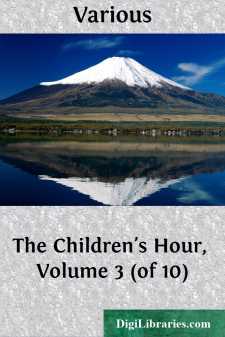Categories
- Antiques & Collectibles 13
- Architecture 36
- Art 48
- Bibles 22
- Biography & Autobiography 813
- Body, Mind & Spirit 142
- Business & Economics 28
- Children's Books 14
- Children's Fiction 11
- Computers 4
- Cooking 94
- Crafts & Hobbies 4
- Drama 346
- Education 46
- Family & Relationships 57
- Fiction 11829
- Games 19
- Gardening 17
- Health & Fitness 34
- History 1377
- House & Home 1
- Humor 147
- Juvenile Fiction 1873
- Juvenile Nonfiction 202
- Language Arts & Disciplines 88
- Law 16
- Literary Collections 686
- Literary Criticism 179
- Mathematics 13
- Medical 41
- Music 40
- Nature 179
- Non-Classifiable 1768
- Performing Arts 7
- Periodicals 1453
- Philosophy 64
- Photography 2
- Poetry 896
- Political Science 203
- Psychology 42
- Reference 154
- Religion 513
- Science 126
- Self-Help 84
- Social Science 81
- Sports & Recreation 34
- Study Aids 3
- Technology & Engineering 59
- Transportation 23
- Travel 463
- True Crime 29
The Children's Hour, Volume 3 (of 10)
by: Various
Categories:
Description:
Excerpt
TO THE CHILDREN
The greater part of this book is made up of stories from the poems of Homer and Virgil. Homer is thought to have lived in Greece about three thousand years ago, and yet his poems never seem old-fashioned and people do not tire of reading them. Boys and girls almost always like them, because they are so full of stories. If you want to read about giants or mermaids or shipwrecks or athletic contests or enchanters or furious battles or the capture of cities or voyages to strange countries, all you have to do is to open the Iliad and the Odyssey, and you will find stories on all of these subjects. Homer can describe a foot-race or the throwing of a discus so that you hold your breath to see who will win; and he can picture a battle so vividly that you almost try to dodge the arrows and spears. He can make the tears come into your eyes by telling you of the grief of the warrior’s wife when he leaves her and their baby son to go to battle; and he can almost make you shout, “Hurrah for the brave champion!” when he tells you what wonderful deeds of prowess have been done. He can describe a shield so minutely that you could make one like it; and he can paint a scene of feasting so perfectly that you feel as if you had been in the very room.
How is it that Homer makes his stories seem so real? There are several reasons, but one of the strongest is because he tells the little things that writers often forget to put in. When he describes the welcome given to two strangers at the house of the lost Ulysses, by Telemachus, son of the wanderer, he begins, “When they were come within the lofty hall, he carried the spear to a tall pillar and set it in a well-worn rack.” That one word, “well-worn,” gives us the feeling that Homer is not making up a story, but that he has really seen the rack and noticed how it looked. The same sentence shows why it is that people do not tire of reading Homer. It ends, “where also stood many a spear of hardy Ulysses.” This reminds the reader that in spite of the hero’s long years of absence, no one has been allowed to remove his weapons from their old place. From this one phrase, then, we can realize how much his wife and son love him, and how they have mourned for him. Telemachus welcomes the strangers, but we can feel how eager he is for them to be made comfortable as soon as possible so he can talk of his father and learn whether they have chanced to meet him in their wanderings. Homer’s poems are full of such sentences as these; and, no matter how many times one reads them, some thought, unnoticed before, is ever coming to light. That is why they are always fresh and new and interesting.
There is a tradition that Homer was blind, and that he wandered about from one place to another, singing or reciting his poems; but this is only tradition, and there is little hope that we shall ever be able to find out whether it is true or not.
Homer’s great poem, the Iliad, is the account of the Trojan War....












